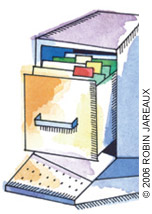
Fam Pract Manag. 2006;13(1):65-66
Let your dog be your receptionist

I let my receptionist go and demolished the reception desk area in my waiting room. Now the waiting room is homier, more spacious, and I don’t have to worry about HIPAA (Health Insurance Portability and Accountability Act) violations occurring there. My patients thought it was odd at first, but now they are used to signing in and taking a seat. They know my nurse or I will help them in a few minutes. I replaced the receptionist with my dogs. They are excellent greeters, and my patients love visiting with them while they wait. The dogs work for nothing and are never rude to the patients.
Reduce credentialing hassles
Motivate with numbers
Clear, achievable, measurable, short-term goals can help encourage staff to give 100 percent. Work with staff to set goals that are personalized to their duties. For example, a receptionist might set a goal to greet and make eye contact with each person who enters the room or to answer the phone within three rings.
Modify patient handouts and forms “just in time”

I never restock the forms in my exam rooms. My patient education materials are stored as Microsoft Word or Adobe PDF files, and I print them out as needed. When medical “wisdom” changes, I can update the computer file and never have to throw out an obsolete form. I take a similar approach to handicap sticker requests, health care proxies, school physical forms and even federal employment forms. The computer is a much better filing cabinet than a filing cabinet.
Avoid burnout
The demands of practicing medicine along with physicians’ tendencies to self-sacrifice and not ask for personal help can lead to burnout. To prevent it, try these tips: exercise; block your schedule to allow for a reasonable departure time and short periods of reflection throughout the day, and don’t overlook them; develop interests outside of medicine; say “no” more often; and pay attention to your values and goals.
Get rid of waste
Quality experts have identified five types of waste within organizations: delay (idle time spent waiting for a test result or payment), rework (retesting, rescheduling, refiling), overproduction (excessive paperwork, defensive medicine), movement (unnecessary transport of people, products or information), and defects (prescribing errors). Engage your clinical and office staff in finding sources of these errors in your practice, and develop a plan for stamping them out.
HELP US HELP YOU
Practice Pearls presents the best advice on effective, efficient practice operations and patient care drawn from the medical and business literature, along with tips developed from your experience. Send us your best pearl (250 words or less), and if we publish it, you’ll earn $25. We also welcome questions for our Q&A section. Send your pearls and your questions to us at fpmedit@aafp.org.